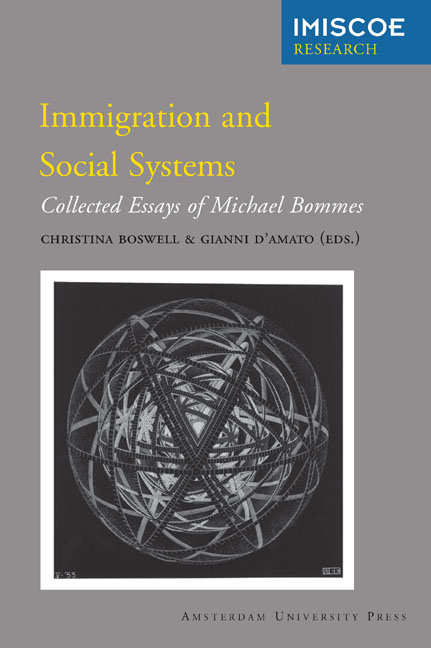Book contents
- Frontmatter
- Contents
- Foreword
- Preface
- Introduction
- 1 Migration in Modern Society
- 2 National Welfare State, Biography and Migration: Labour Migrants, Ethnic Germans and the Re-Ascription Of Welfare State Membership
- 3 Systems Theory and the ‘Ethnic Inequality’ of Migrant Workers
- 4 Welfare Systems and Migrant Minorities: The Cultural Dimension of Social Policies and its Discriminatory Potential
- 5 Transnationalism or Assimilation?
- 6 ‘Integration takes Place Locally’: On the Restructuring of Local Integration Policy
- 7 Illegal Migration in Modern Society: Consequences and Problems of National European Migration Policies
- 8 General and Specific Characteristics of Networks: (with Veronika Tacke)
- 9 National Paradigms of Migration Research: (with Dietrich Thränhardt)
- References
- Other IMISCOE Titles
7 - Illegal Migration in Modern Society: Consequences and Problems of National European Migration Policies
Published online by Cambridge University Press: 09 January 2021
- Frontmatter
- Contents
- Foreword
- Preface
- Introduction
- 1 Migration in Modern Society
- 2 National Welfare State, Biography and Migration: Labour Migrants, Ethnic Germans and the Re-Ascription Of Welfare State Membership
- 3 Systems Theory and the ‘Ethnic Inequality’ of Migrant Workers
- 4 Welfare Systems and Migrant Minorities: The Cultural Dimension of Social Policies and its Discriminatory Potential
- 5 Transnationalism or Assimilation?
- 6 ‘Integration takes Place Locally’: On the Restructuring of Local Integration Policy
- 7 Illegal Migration in Modern Society: Consequences and Problems of National European Migration Policies
- 8 General and Specific Characteristics of Networks: (with Veronika Tacke)
- 9 National Paradigms of Migration Research: (with Dietrich Thränhardt)
- References
- Other IMISCOE Titles
Summary
Discussions about the structures, causes and consequences of illegal migration or about the circumstances of illegal migrants begin in many cases, and not without good reason, by establishing what the term ‘illegal migration’ is supposed to signify. Here the talk of ‘illegal migration’ is repeatedly seen as the terminological stabilisation of a misjudgement: on the one hand, because most of those who live in Europe illegally, i.e. without a residence permit, are not ‘illegal migrants’ in the sense of having illegally crossed the external borders of Europe or national borders; on the other hand, because illegality as such is not, strictly speaking, based on a criminal offence but in the first instance on an offence in terms of residency law or employment law – even if it is often seamlessly connected with other infringements. Here this term is taken as a starting point, despite its ambiguity in public discourse, and the choice is made to retain the facts indicated by the term instead of trying, in the name of ‘political correctness’, to semantically correct defensive positions which are assumed to be closely linked with the taboo forms of description. After all, discarding this term means obscuring the important social fact which it indicates: illegal migration is always also connected to the attempt to conceal one's actions from the eyes of the law. The consequence for those affected is that they rob themselves of the legally mediated capacity for conflict and consequently find themselves exposed in differing degrees to the risk of social extortion.
Against this background it is hardly surprising that legal experts not only disagree on what legal residence means and where this ends, but they offer even less information on what exactly is meant by the social fact of ‘illegal migration’. From the point of view of migration research, it makes sense to start from the other end and with the in-house tools of migration research, as it were, i.e. to begin with the fact of migration and then to ask what the special features of illegal migration are.
When migration becomes a matter for public discussion, what is meant is international migration.
- Type
- Chapter
- Information
- Immigration and Social SystemsCollected Essays of Michael Bommes, pp. 157 - 176Publisher: Amsterdam University PressPrint publication year: 2013



